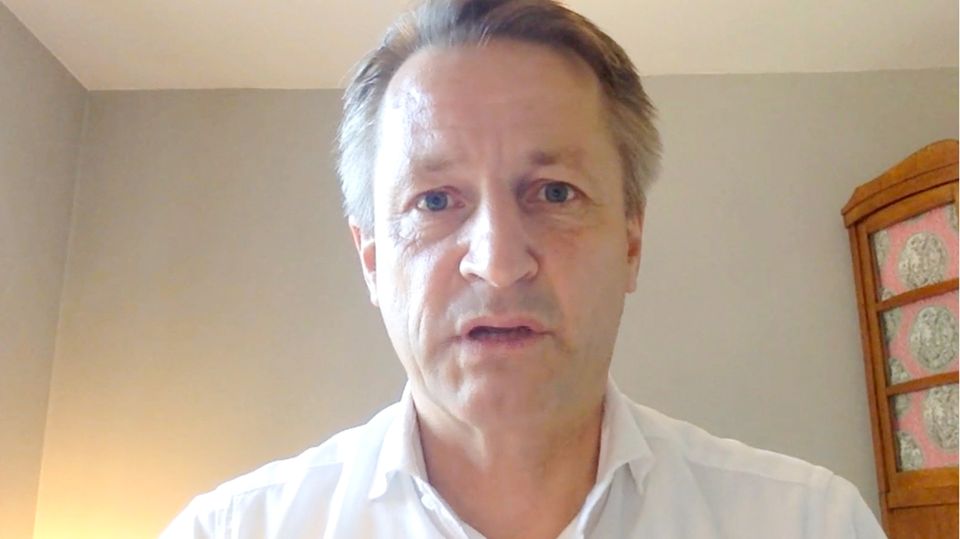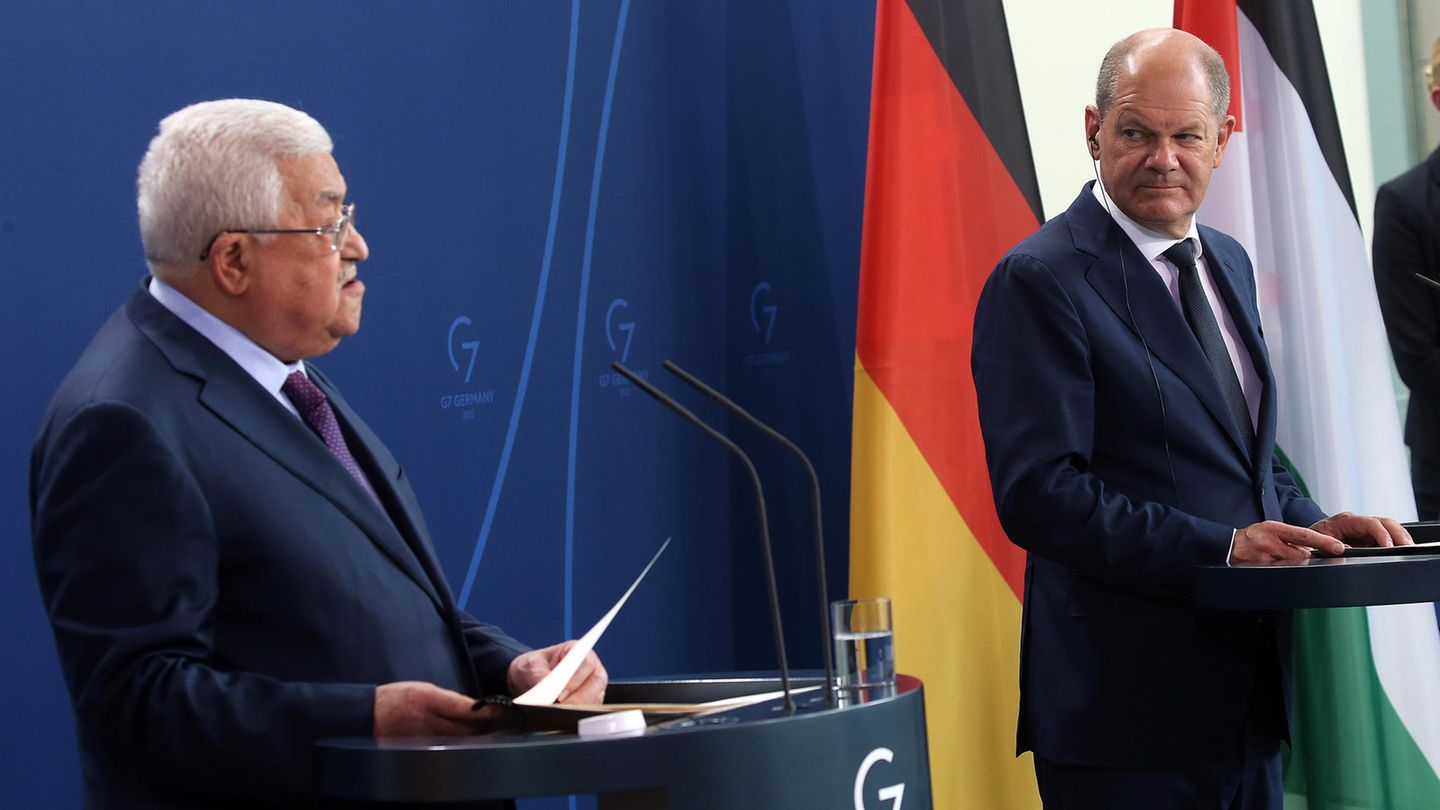analysis
Scholz ‘failure, Abbas’ another oath of revelation: The scandal in the Chancellery around the “Holocaust” comparison of the Palestinian boss is a communicative disaster-on many levels.
What is to be said? Olaf Scholz did not give a good figure, his government spokesman also did not reveal Mahmud Abbas (once again) deep abysses that will still be talked about.
But one by one.
On Tuesday afternoon, a joint press conference of the Federal Chancellor and Palestinian President ended in a scandal that throws a bad light on everyone involved.
Abbas outraged with over -the -end statements against Israel, described Israeli politics as a “apartheid system” and accused the state “50 massacre, 50 holocausts” of Palestinians.
In the presence of the journalists, Scholz immediately made it clear that he did not endorse Abbas’ formulation of an “apartheid system” for Israel, but immediately failed to react to the Holocaust comparison – because, as the Chancellor’s Office said afterwards, he did the opportunity to the replica was cut off. Immediately after Abbas’ derailment, government spokesman Steffen Hebestreit ended the press conference.
Already in the evening after the press conference, a wave of indignation broke out over Scholz and Hebestreit. The CDU chairman Friedrich Merz that Scholz should have “clearly and clearly contradicted the Palestinian president and ask him to leave the house!” The fact that lifting dispute was closed by the press conference, “before the Chancellor could even take a breath, is politically instinctive,” later the FDP politician Marie-Egnes Strack-Zimmermann told him.
It is a communicative disaster, on many levels.
Olaf Scholz tries to limit the damage
On the one hand: Scholz could still have spoken, or rather not have had to let his spokesman cut him off. Nevertheless: The “mistake” is “on my cap”, who thus took responsibility for what happened. However, the fact that the Chancellor passed his guest with a handshake, only moments after the “Holocaust” comparison, is not in his responsibility. The picture will remain. Likewise, the impression that Scholz reacted too late to the derailments Abbas’: It was only in the evening that a first statement followed at the request of the newspaper, the next morning the clear distance from the “unspeakable statements”.
On the other hand: Abbas was not for the first time with relativizations to the Holocaust. In May 2018, the Holocaust was not triggered by anti-Semitism but by the “social behavior” of Jews. Shortly before, he had described Israel as a “colonial project” that had nothing to do with the Jews. And already in his doctoral thesis presented in the early 1980s, he had put the Holocaust into perspective and accused the Zionist movement of collaborating with the Hintler regime. The mindset of the Palestinian President is thus well documented. The Chancellery could have been prepared for Abbas to take advantage of the stage that was offered to him – and may also be able to prevent it.
The focus of the current debate is, above all, on Scholz’s failure to react to Abbas’ statements at first and then only later, rather than the rhetorical dissolution of limits by the Palestinian President himself – and the possible consequences of this.
For the Chancellor, this is also his credibility at stake. The Central Council of the Jews reacted with horror to Abbas’ Holocaust comparison, which treads the memory of six million murdered Jews and damaged the memory of all victims. “I think that a relativization of the Holocaust, especially in Germany, at a press conference in the Federal Chancellery, I think is scandalous”. Scholz may feel addressed.
The Chancellery is now trying to limit damage ,. A phone call with the Israeli Prime Minister Jair Lapid is planned for Thursday, who called Abbas’ statements “not only a moral shame, but also a outrageous lie”. The Israeli government focuses its criticism on Abbas failure, not on Scholz’s silence. Nevertheless, the incident should burden the relationship with Israel.
A “dark shadow”
The Palestinian President backtracked on Wednesday, saying he didn’t want to question the uniqueness of the Holocaust. Rather, he meant “the crimes and massacres against the Palestinian people” committed by Israel’s armed forces since the Nakba.
This is obviously not enough for Scholz. Abbas must “recognize the singularity of the Holocaust without any restriction”. The “derailment” of the Palestinian President “a dark shadow” on the relationships of Germany to the Palestinian Authority. A trip from the Chancellor to Ramallah was only “difficult to imagine” in the foreseeable future.

The EU MP Nicola Beer (FDP) does not want to leave it in words-and calls for tangible consequences: “Who, like Abbas, pulls the Holocaust commemoration into the dirt,” said Beer, should not assume that “EU financial aids for The Palestinian Autonomy Authority remain a sure-fire success. ” The EU is the largest donor to the Palestinian Authority, which is headed by Abbas. “Given the scope of the incident, the European Union should consider withholding funds for a limited period,” Beer said.
So Abbas cannot afford to break off relations with Germany, let alone the EU. In addition, the Federal Republic has an important mediating role in the crisis-ridden region.
This is also part of the dimension of the failed press conference, which is currently being determined by the debate about Scholz’s silence. This could change soon.
Source: Stern
David William is a talented author who has made a name for himself in the world of writing. He is a professional author who writes on a wide range of topics, from general interest to opinion news. David is currently working as a writer at 24 hours worlds where he brings his unique perspective and in-depth research to his articles, making them both informative and engaging.




